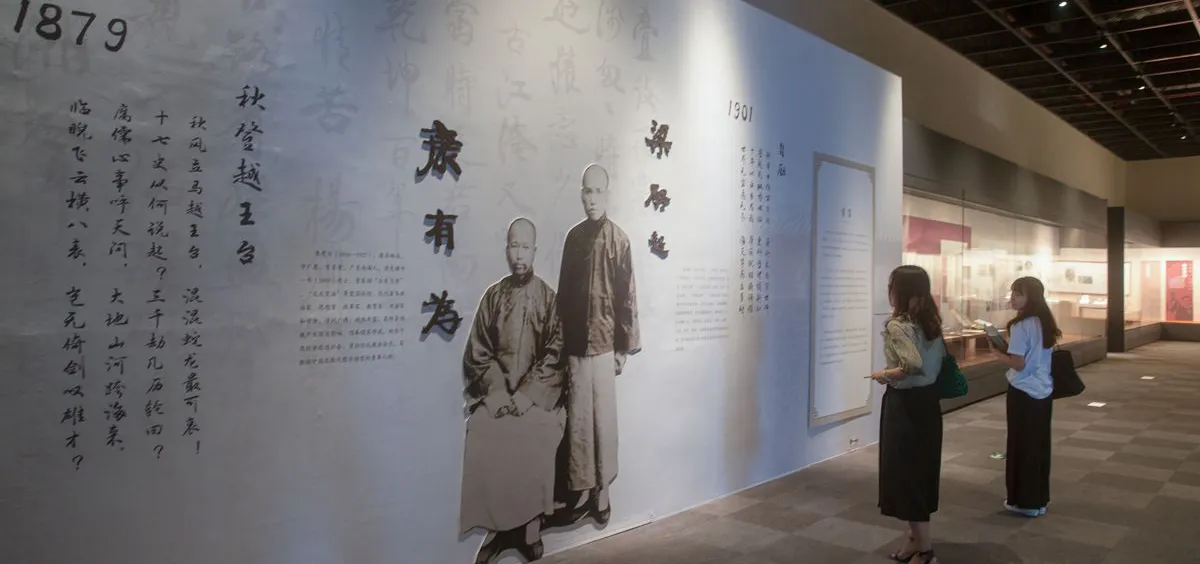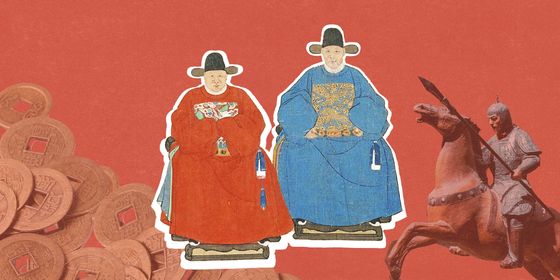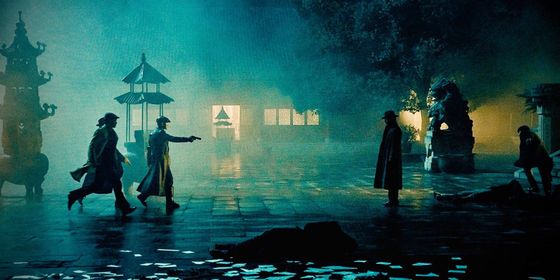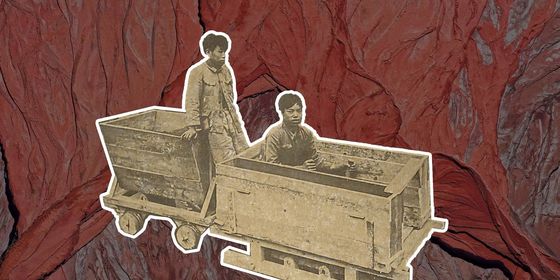When a generation is convinced they might be the last of their civilization, they take action—and sometimes wind up bitterly disappointed
In the year 1895, the taverns, inns, and brothels of Beijing were full of angry young men. They were bearded, angst-ridden millennial males a whole century before mass-market craft beers, WeChat, and Reddit.
They’d come to the capital to fulfill the duty of all young scholars of that time: taking part in the triennial imperial exams. A pass meant access to the highest echelons of office in the emperor’s service. Only a very lucky few would succeed, their less fortunate peers forced to return to toil in academies hoping for another chance, or else doomed to a career in the penumbra of society: as teachers, secretaries, or managers of family estates.
But 1895 was no ordinary exam year. News of war and defeat had spread throughout the capital: Hostilities over who would dominate the Korean Peninsula had pitted the Qing, then in seeming inexorable decline, against the Japanese Empire, which, since the “restoration” of the Meiji Emperor in 1868, had undergone an ambitious reform and modernization program that threatened to destabilize the balance of power in East Asia.
These young men saw the Sino-Japanese War of 1894-1895, and the humiliating Treaty of Shimonoseki, as an existential crisis which threatened not only their country but its whole civilization. Fifty years of foreign wars, unequal treaties, and devastating internal rebellions had reduced the once-mighty Qing dynasty to a fragile shell, desperately clinging to power in far-flung regions of Asia.
And now, at the turn of the 20th century, new, and even more aggressive nations—Italy, Germany, the US, Russia, Japan—were jockeying for position and territory with the older imperialist powers, England and France. The world was being carved up—would China be next?
Would these “centennials,” in fact, be the last generation of Chinese scholars?
From the jaws of potential cataclysm, these young men were willing to break bad, stretching the boundaries of conventional wisdom and looking beyond their narrow studies of Confucian classics—into the worlds of religion, metaphysics, and world systems—to save Chinese civilization.
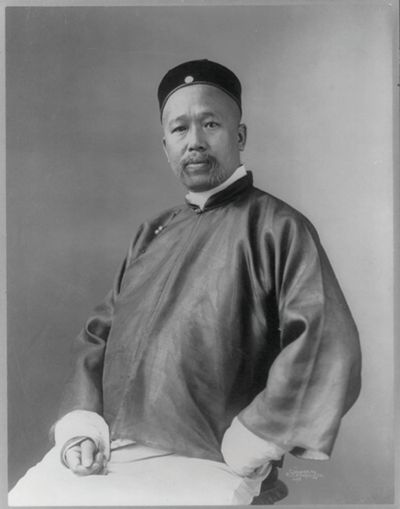
Kang Youwei (Fotoe)
Kang Youwei (康有为) was a Cantonese scholar, in the capital for his exams. At 37, a little older than many of his cohorts, Kang was a mentor to some of his fellow provincials and a savagely creative thinker with a not-altogether healthy Messianic complex. He was willing to contort the framework of philosophy as far as necessary to fit his unorthodox worldview.
“Confucius was a reformer of institutions,” Kang wrote, dangerous thinking at a time when a sclerotic Qing court seemed less and less tolerant to those who suggested bold changes. Prior to Kang, a generation of reformers called themselves the “Self-Strengthening Movement” (洋务运动), their beliefs articulated by leading statesman Zhang Zhidong (张之洞): “Chinese learning for what is essential and Western learning for when it is useful.” Having fought off Christian zealots of the Taiping Rebellion of the 1850s and 1860s, they had then spent the ensuing decades building factories, arsenals, and shipyards with help from foreign experts, and the tacit support of the Qing government.
The self-strengtheners believed in Confucian values but also the importance of new technology. They wanted to update the hardware, but keep the operation system.
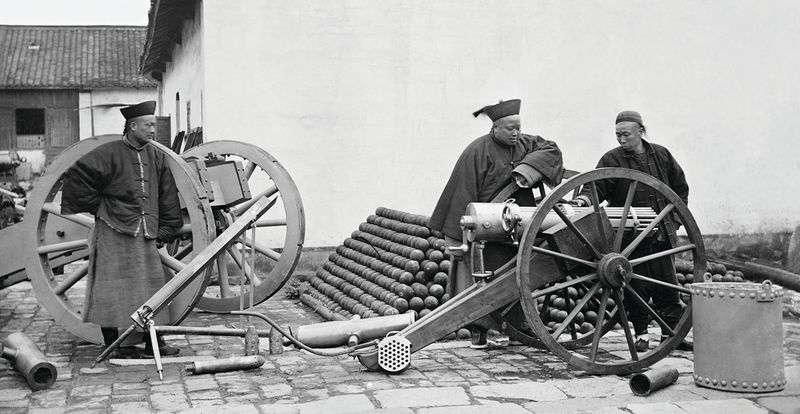
Nanking Jinling Arsenal founded by Li Hongzhang (李鸿章) during the “Self-Strengthening Movement” (Fotoe)
Their crowning achievement had been the Beiyang Fleet, an impressive modern navy and the largest in Asia, its twin flagships the German-built Dingyuan and Zhenyuan. And yet this imposing armada was destroyed in just a few months. The Imperial Japanese Navy sank the Zhenyuan and four other ships at the Battle of the Yalu River in September, 1894. A few months later, a Japanese assault at Weihaiwei on the Shandong Peninsula destroyed what was left of the fleet, the Dingyuan, and whatever remained of Qing ambitions to compete with the superpowers.
It was a crippling and humiliating blow to China’s civilizational prestige. Now younger men would propose more radical solutions.
One of Kang’s followers was Tan Sitong (谭嗣同), an excitable Hunanese man with a fascination for martial arts and religious mysticism. “When Confucius first set forth his teachings, he discarded the ancient learning, reformed existing institutions, rejected monarchism, advocated republicanism, and transformed inequality into equality,” he wrote.
Strong words in opposition to the status quo from a future martyr.
Along with another of Kang’s disciples, Cantonese scholar Liang Qichao (梁启超), Kang, Tan, and other learned young men began drafting a petition for radical reform they hoped would be read by the Guangxu Emperor (光绪帝).
The young monarch was one of their cohort, they felt. He had been emperor for over 20 of his 24 years, but only recently had his aunt, the Empress Dowager Cixi, allowed him to govern independently of her close supervision. In this changing of the guard behind palace walls, Kang sensed an opportunity.
“Your majesty knows under the present circumstances reforms are imperative and old institutions must be abolished,” Kang wrote in his 1895 petition. “I beg Your Majesty to adopt the purpose of Peter the Great of Russia as our purpose and to take the Meiji Reform of Japan as the model for our reform.”
It would take over three years before Kang’s petition would make its way to the hands of the emperor, but in the summer of 1898, these young men—with the idealism and hubris characteristic of every generation—joined forces to change the very nature of the Empire.
For 100 days that summer, between June and September, the Guangxu Emperor and his new advisors Kang, Liang, and Tan issued a dizzying flurry of reform edicts: Modernize the educational system! Cut dead weights from the bureaucracy! Reform the military! Develop national industries! A national university! Move the capital! A constitutional monarchy!
Some of these ideas, such as a national university, were more feasible than others (moving the capital) but almost all the proposed changes upset established interests. A change was needed, but the centennials and the Guangxu Emperor made the rookie mistake of trying too much, too fast.
Opposition coalesced around the Emperor’s aunt, the Empress Dowager, and in September she returned from semi-retirement amidst the forests and lakes of the Summer Palace to retake control of the government from her wayward nephew. Kang and Liang fled into exile. Tan and five others, including Kang’s younger brother, were executed in Beijing.
Kang Youwei would never regain his former influence. His ideas progressed into utopian realms of a Grand Commonality of the human species while his conduct deteriorated. He squandered the donations solicited in support of “saving the emperor.” His former pupil Liang became one of 20th-century China’s first journalists, although he too matured from a young man seeking to turn the world upside down in 1898 to a sober voice calling for restraint and reform (not revolution) as the Qing dynasty gave way to a new republic.
Perhaps 1898 was a missed opportunity. Antiquated authoritarian governments often face the same challenge: reform and become irrelevant; resist only to be overthrown.
The centennial scholars and their emperor were part of a generation in crisis—one which were loath to stand idle while their whole civilization was taken away by aggressive foreign powers and corrupt politicians. Ultimately, they changed very little, but by first introducing the idea the fundamental problems required bold new thinking, they pointed the way forward for the next generation of revolutionaries and reformers.
Youth Reform is a story from our issue, “The Noughty Nineties.” To read the entire issue, become a subscriber and receive the full magazine.





